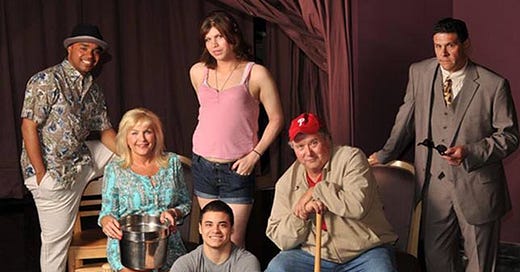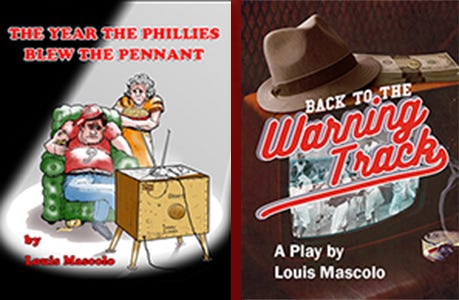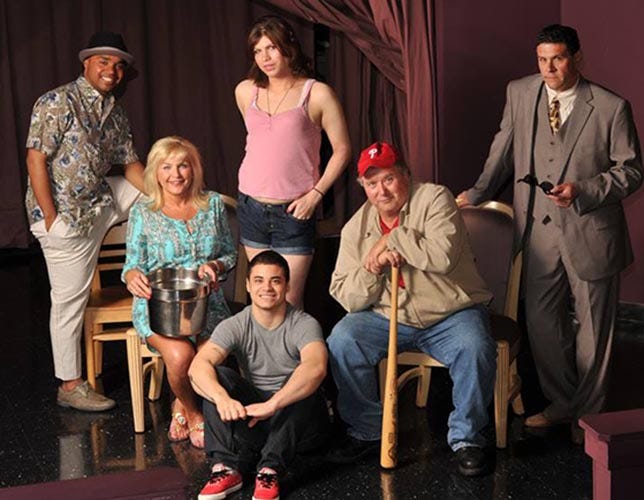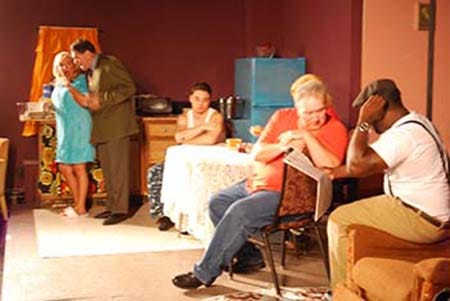Programs from “The Year the Phillies Blew The Pennant,” Later changed to
”Back to the Warning Track.”
This is a post I should have written quite a while ago but never got around to. My play, “The Year the Phillies Blew the Pennant,” was staged a few years back at a ninety-nine seat Ashley McCormick Entertainment Center in Bridgeton, NJ. I subsequently renamed it, “Back to the Warning Track.”
It took me over a year to get the play produced. I had a professor at NYU who said to a class of drama people, “If you want to succeed get a rich wife/husband.” So true. I didn’t follow his advice.
In any case, my play takes place in 1964 and is about a working-class man, Larry Buntley, a life-long Philadelphia Phillies baseball fan. 1964 was the year Phillies pitcher, Jim Bunning, pitched a perfect game on Father’s Day.
Larry has never had much financial success, but still has a nice life though—a steady job, a wife of 25 years, a twenty-something daughter and an eighteen-year old son, and a life-long friend, Marvin, a black man he grew up with and went to WWII with.
His wife, Rose, constantly compares him to her very successful brother, who in fact is an international smuggler/gangster. A seemingly fortuitous event happens in the Buntley household, when his daughter, Lucy, a road manager for a rock group, returns home with a brief case full of money she found in a cab ride home.
The money takes over their lives and they begin to enjoy their new prosperity. Harry is also in his glory, because the Phillies, perennial losers, are in first place and seem sure to win the pennant and go to the World Series.
Just then, the brother, Bert, shows up and it's downhill for Larry after that. The money belongs to a Philadelphia gangster, who the brother knows, and he wants it back. Once returned, Larry returns to his old status as a broke, working-class stiff.
Bert approaches him with an opportunity to make significant cash via a new venture he has initiated-delivering bodies of dead American soldiers being shipped from Vietnam from Dover Delaware the airport to Philadelphia.
What Harry doesn’t know is that Bert Harry he is stuffing the coffins with smuggled goods, including heroine, which is the reason he is giving Although feeling bad for the dead servicemen, Harry can’t pass up such a significant payoff. He reluctantly agrees. He enlists Marvin, who is also in need of cash, to do the actual driving and unknowingly transport the stashed contraband.
Meanwhile, his son, Freddie, is dumped by his girlfriend, and in a funk, enlists in the Marines to the horror of the family. Shortly after, Lucy is offer another job with another band, and leaves home again.
Things start to go well for Harry. He and Marvin are making more money than they ever thought possible when suddenly his world comes crashing down. They receive notice that Freddy has been killed in Viet Nam.
Further disaster awaits when Marvin overhears a phone conversation of Bert talking to the Philly gangster informing him of the status of the next drug shipment.
Realizing he has been duped by his beloved friend and his evil brother-in-law into a criminal enterprise, he attacks Bert. Rose enters and finds out her successful businessman brother is actually a mobster. Bert leaves humiliated and angry. Marvin disavows his friendship with Bert. Rose is crushed.
The Phillies lose nine out of their last twelve games and are eliminated from winning the Pennant. Rose realizes her mistake in demeaning her husband for not being like her brother. Her pressure unknowingly influencing him into a criminal enterprise.
As the play ends they cling to each other for support, when unexpectedly Freddie walks in, wounded but not dead.
Originally, I had approached the new Levoy Theater in Millville, NJ that hadn’t opened yet. There was a lot of public enthusiasm for the theater. It is gorgeous, and I immediately had fantasies about staging my play there. I was initially enthusiastically greeted, and it seemed they were up for a new local playwright to stage a play.
The first element in its production was to have a reading. A reading is basically actors sitting around a table and reading the script. I invited some friends to listen and give me opinions, which included Robert Dragotta, a Bridgeton native, who was working in New York City as a theatrical producer. The results of the reading were very positive, and I received some great feedback.
The play was way too long, though. It ran about two-and-a-half hours, about forty-five minutes too long. Also, plot and character elements had to improve.
I went back to work to edit it with the help of Mr. Dragotta’s dramaturgy created a respectable script. We trimmed it to under two hours, changed some plot elements and cleaned up the dialogue.
The staff of the Levoy who attended the reading reacted very favorably. I thought I was on my way. Not so fast. In fact, it took about another six months of constant inquiry to finally get an initial production meeting.
Now, I had been going under the incorrect assumption that the Levoy would be a partner with me in this project. Local playwright, new local theater—made sense. They’d provide the theater, marketing expertise and most of the production money. I would raise the rest of the capital, produce and direct it. They would keep the ticket money to reimburse them.
Unfortunately, when I sat down for the meeting, they handed me a proposal. They were offering to rent me the space, lights, sound system and staff, and I was expected to pick up the whole cost. Apparently, at that point, they were figuring I had deep pockets. Oops! I left, speechless. That was the end of the Levoy.
I looked into a cheaper space to do the show, and while I was searching, Robert asked me if I wanted to stage the play at a new theater in Bridgeton, NJ. He would provide the financing. After taking a look at the 99 seat space, I agreed. It wasn't the Levoy for sure. It was in the process of being renovated, and was a space with potential.
Next came casting. Now this is an incredibly difficult task in Cumberland County, New Jersey. There is no real market for actors in this area. I had approached the local amateur group, Cumberland Players for actors, but found them to be an incredibly cliquish group who were not interested in outsiders wandering onto their turf.
I tried contacting the Off Broad Street Players, who worked with the Levoy, but had no luck. Fortunately, Dragotta knew Lori DiMatteo, a local woman who had acting experience at Boston College, and I cast her as the mother, Rose. He also came up with another professional actor Tom Ranizewski, from Cape May. After an audition, we immediately cast him as the main character, Larry.
I put an ad in Craigslist and a young woman, Raine St. Laurent, answered the ad and auditioned. She was ultimately cast as the daughter, Lucy. I was so happy to have her, I never asked her if she had any acting experience (she didn't).
We found two young actors from Rowan University in Glassboro, Tydrick Sawyer, who I cast as the son Freddie and Jonathan Avilez, as the daughter's boyfriend, Paco. Another actor with some experience, Mark Lentine, answered an ad online and was given the part of Bert.
I couldn’t find a black actor to play Marvin, which was becoming a problem. After some searching, I found Levi Feeney. He was excellent, and I cast him for Marvin. I found a talented young woman, Michelle Andrews, to act as set designer and stage manager. A good friend of mine with an excellent sports caster voice, Glenn Lillie, recorded the voice over for the Phillies TV announcer.
It was a great relief until Tommy Ranizewski called to tell me he couldn't do the part, but he did suggest a replacement, John Alvarez. Back to casting. John looked just like the character I pictured and, even better, had a lot of acting experience. He was cast as Larry.
Okay, I finally the space and the actors and the date for production. Nightmare. The theater is a black box space, small but usable. The owner informs me because of fire regulations, we can only use about 70% of the stage area. So now we are down to a play on a postage stamp.
The actors were all amateurs who had real jobs and most of them weren't nine to five. So scheduling was an incredibly difficult. We only had four weeks with two to three-hour rehearsals per night.
Many times only two of the seven showed up. Progress was going to be very slow. Then the producer tells me he's taking a two week leave to go to Rome, right in the heart of the rehearsal schedule.
The cast of The Year the Phillies Blew the Pennant and their roles include (from left) Jonathan Aviles (Paco Sanchez), Lori DiMatteo-Fiocchi (Rose Buntly), Tydrick Sawyer (Freddy Buntly), Raine Laurent (Luci Buntly), John Alvarez (Harry Buntly), Mark Lentine (Bert Tutabella). Not pictured are Levy Feeney (Marvin Dubs) and sportscaster Glenn Lilli
So now I'm also the producer as well as the writer and director. But he is the one with the money for the show. Set construction stops. The lighting designer, who is supposed to appear and install lights, never shows up. I wind up dealing with a ton of problems I didn’t expect—shouting screaming, hair pulling--but we plugged along.
So now we're one week to opening. Despite everything, the show is looking good, except for the end of the last act, which sucks. Back to work rewriting, and I finally come up with an acceptable ending. Robert finally shows up. Cash is infused and finally the set is being finished. The crew works while we rehearse. We're falling all over each other.
I'm freaked because we have no lights and the show is only a few day away. We never got the lights.
Opening night we ran the show with just house lights flipping switches. Anyone in theater knows how important lighting is to the show in setting mood and focusing action. So I was disappointed.
Fortunately, despite extreme adverse conditions, the actors did an admirable job and pulled off the play, and we didn't hear much about the lack of lighting. We received very positive reactions from the audience, many of them theater professionals, so it was legitimate praise. In that respect, I was very pleased.
Scene from the “The Yearl The Phillies Blew the Pennant”
My first play was staged in front of a paying audience. Now that is a big deal. I was thankful Robert saw the potential of the play, and offered excellent suggestions for its improvement. It gave me opportunity to see my characters come to life.
Number two, I did get some regional press from the Philadelphia Daily News. Long time sports writer, Chuck Darrow, attended the play and gave me a large article in the paper. Great exposure. You can read it here (unfortunately behind paywall). Here’s his column and info Chuck Darrow
Number three, and most ironic, the actor we first cast as the father, Tommy Ranizewski, is not only an experienced Equity actor, he is also a producer and has previously produced theatrical and musical productions. He loved the play and commissioned me to write a play for him to be produced in New York City. Wow! Talk about luck!
If you'd like a copy of “The Year the Phillies Blew the Pennant” (now titled, “Back to the Warning Track,”) you can find it here on Amazon.
As sad note about “The Phillies…” play. The Eagle Theater scheduled a full production after an amazing reading by some equity actors at their place. The play was scheduled, cast with professional actors and in April of 2020 was cancelled at the last minute because of Covid. Talk about being broken-hearted.







